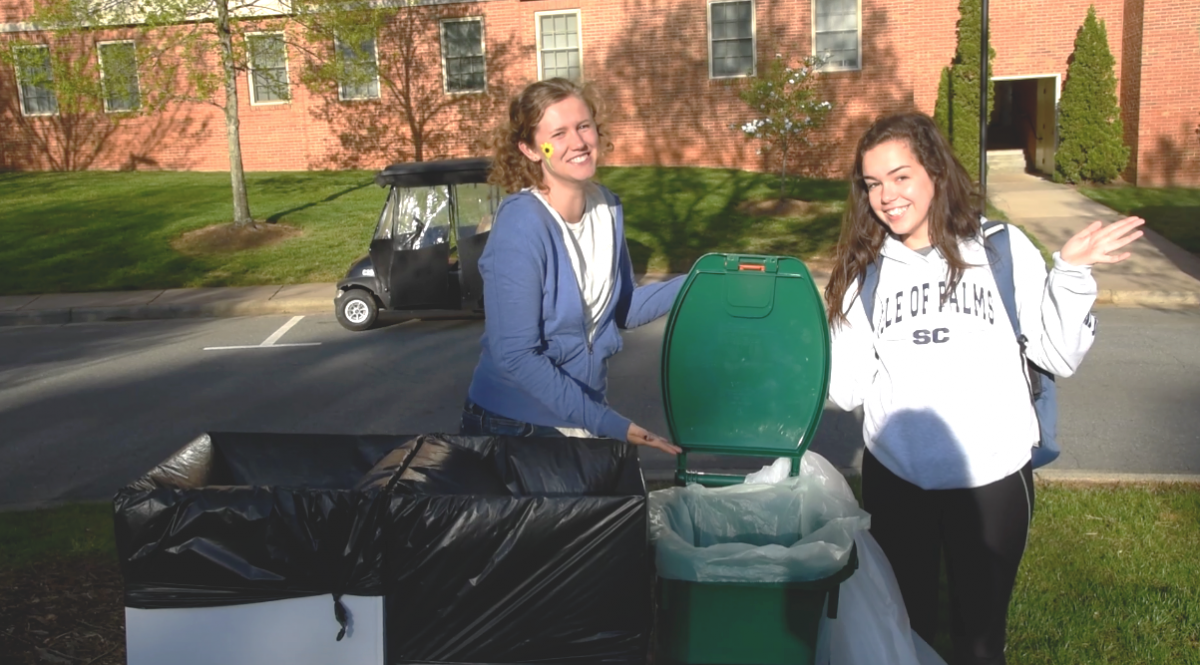Compost Crew Minimizes Food Waste

By Julia Haines, Editor-in-chief of the Old Gold & Black
Originally published in the September 6 issue of the Old Gold & Black
Many of the freshmen orientation events on move-in weekend were heavily policed by the Office of Sustainability’s Compost Crew, a group of students dedicated to ensuring food waste on campus is dealt with responsibly.
The Office of Sustainability paired with student volunteers and environmental activists last semester to create the Compost Crew, a volunteer group that already has over 40 members and counting.
“[The Compost Crew] was formed due to an overwhelming interest in organics collection and composting on campus and was developed and grown by a number of students,” said Brian Cohen, the Program Coordinator for the Office of Sustainability. “In typical Wake Forest fashion, students identified a problem and worked to come up with a solution.”
At the Taste of Winston-Salem event, waste bins at every corner were staffed by members of the Compost Crew in green t-shirts, manually sorting items as they came off the plates of attendees. Compost Crew members educated attendees about how to properly recycle and about what can and cannot be composted.
“Getting students to stop and think about where they could direct some of their waste, be it to be composted or recycled, is challenging at least 18 years of the practice of sending everything to a landfill,” said sophomore Katherine Pitchford. “Just our presence at events, standing by the waste and assisting in directing what can and cannot be composted, is letting people know that there is a force on campus that is devoted to doing more for the environment.”
While the Office of Sustainability already directs organic waste from Campus Kitchen, Campus Grounds and other smaller facilities to the compost space in Campus Garden, larger volumes of organic waste from events are being brought to Gallins Family Farm in Davie County, NC. This local facility then turns it into soil and sells it to local farmers and gardeners.
As the semester progresses, Compost Crew members plan to continue to staff campus events that involve food consumption or that produce significant food waste. They have been “pleasantly surprised” at how quickly the campus adopted their initiative as a new norm, and stress the need for more volunteers.
“Support for this initiative has been amazing campus-wide,” Cohen said. “Honestly, the most difficult part is keeping up with the demand.”
Last semester, while the Compost Crew did exist, few noted the impact they made or knew of their presence at campus events.
“Most people were unaware of what we did on campus last year,” Pitchford said. “When the Compost Crew would help separate organic waste at events, attendees were often curious about what we were doing. It was humorous to have people go through every item on their plates and say ‘Is this compostable? Okay, what about this?’”
In addition to staffing campus events, the group also started an office organics collection program over the summer and launched a pilot program in Collins to bring organics collection to more residence halls. The office organics collection program has 18 active participants, a number which staff members hope will grow as awareness of the program expands.
“I would like to find ways to shape the group into something that people are passionate about and generate ideas for how to grow,” junior Julia Stevens said, the Waste Reduction Assistant for the Office of Sustainability. “Our ultimate goal … is to demonstrate enough need for this service so that it becomes institutionalized.”
“In the coming months, we expect the Compost Crew to continue to grow and expand its reach,” Cohen said. “Ultimately, we expect to get to a point where organics collection is second nature for all students, faculty and staff in all locations on campus.”
